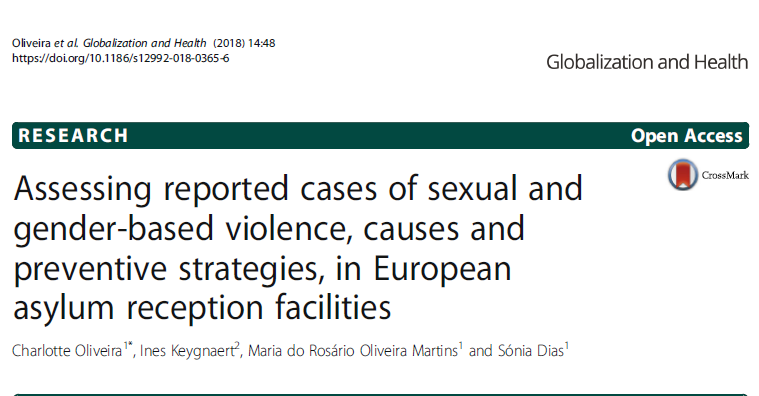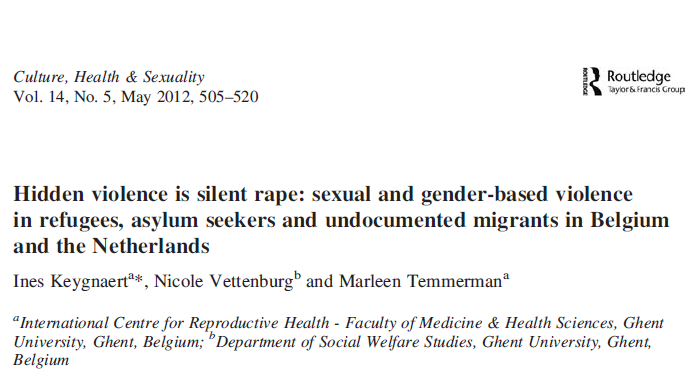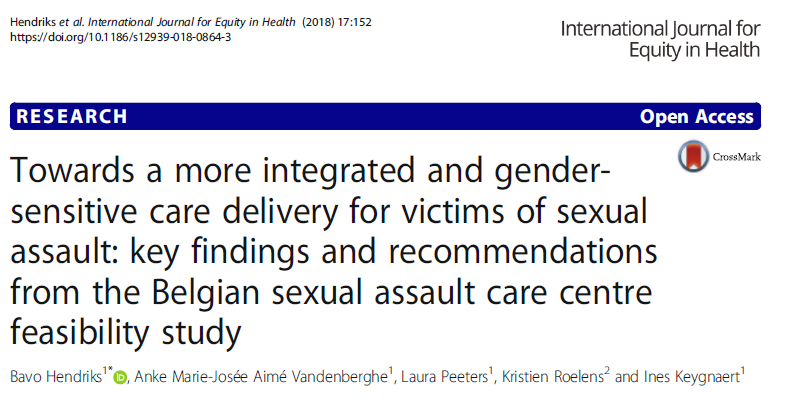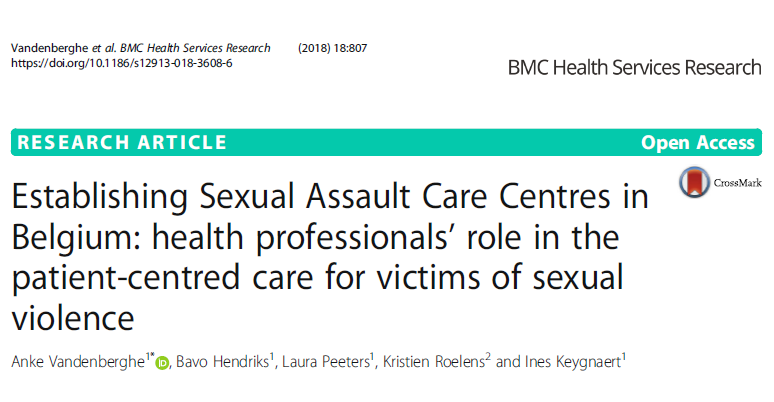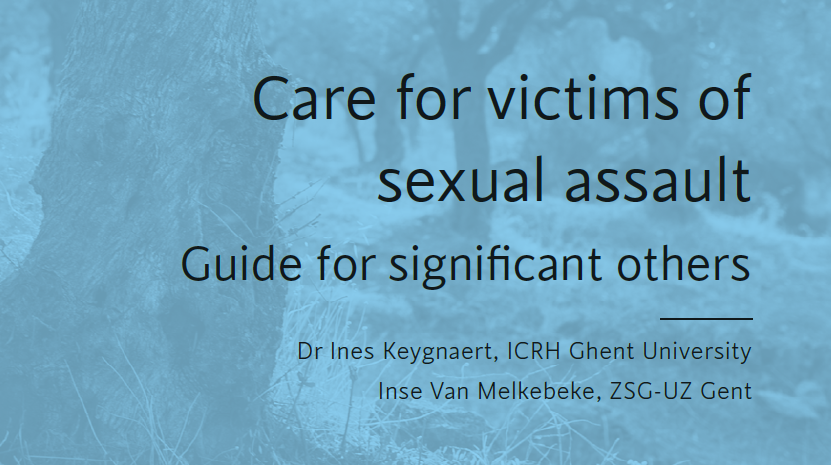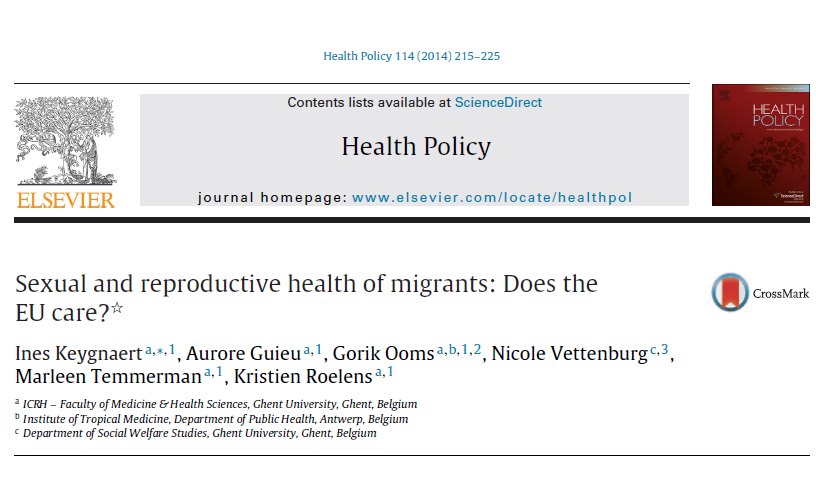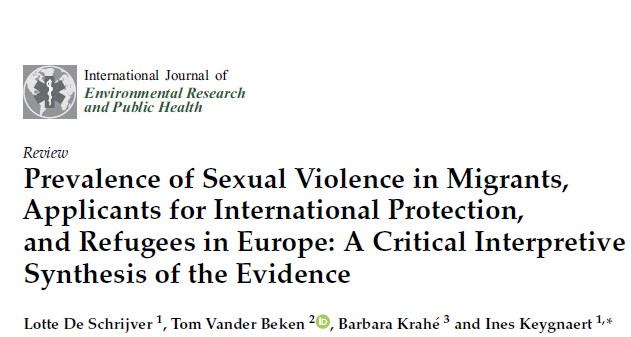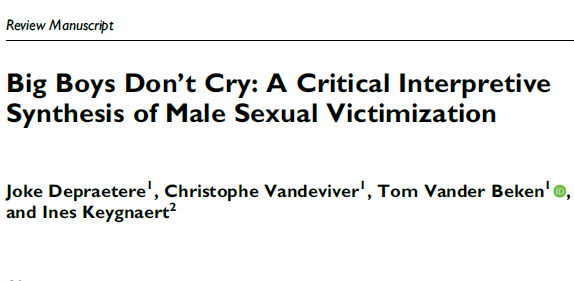For a quick search in the Knowledge database below, please use the search box. Also, note that using one or more of the dropdown filters will optimise your search.
Watch this video to find out more about our Knowledge Database and the publications we have collected here for you: video
Knowledge Database
-
Assessing reported cases of sexual and gender-based violence, causes and preventive strategies, in European asylum reception facilities
Charlotte Oliveira, Ines Keygnaert, Maria do Rosário Oliveira Martins, Sónia Dias | Published in 2018
Sexual and gender-based violence (SGBV) is a widespread public health problem and a violation of human rights rooted in gender and power inequities. Refugees, asylum-seekers and migrants living in European asylum reception facilities (EARF) are especially vulnerable to SGBV. To contribute to closing the gap on systematic and accurate evidence on SGBV, we aim to explore reported cases of SGBV, causes and preventable measures described by residents and professionals from EARF.
Keywords: gender based violence, migration, prevention, sexual violence, victimisation -
What the eye does not see: a critical interpretive synthesis of European Union policies addressing sexual violence in vulnerable migrants
Ines Keygnaert, Aurore Guieu | Published in 2015
Europe, refugees, asylum seekers and undocumented migrants are more vulnerable to sexual victimisation than European citizens. They face more challenges when seeking care. This literature review examines how legal and policy frameworks at national, European and international levels condition the prevention of and response to sexual violence affecting these vulnerable migrant communities living in the European Union (EU). Applying the Critical Interpretive Synthesis method, we reviewed 187 legal and policy documents and 80 peer-reviewed articles on migrant sexual health for elements on sexual violence and further analysed the 37 legal and 12 peer-reviewed articles among them that specifically focused on sexual violence in vulnerable migrants in the EU-27 States. Legal and policy documents dealing with sexual violence, particularly but not exclusively in vulnerable migrants, apply ‘tunnel vision’. They ignore: a) frequently occurring types of sexual violence, b) victimisation rates across genders and c) specific risk factors within the EU such as migrants’ legal status, gender orientation and living conditions. The current EU policy-making paradigm relegates sexual violence in vulnerable migrants as an ‘outsider’ and ‘female only’ issue while EU migration and asylum policies reinforce its invisibility. Effective response must be guided by participatory rights- and evidence-based policies and a public health approach, acknowledging the occurrence and multiplicity of sexual victimisation of vulnerable migrants of all genders within EU borders.
Keywords: humanitarian, justice, migration, sexual violence, victimisation, victims' rights -
Sexual and gender-based violence in the European asylum and reception sector: a perpetuum mobile?
Ines Keygnaert et al. | Published in 2014
Refugees, asylum seekers and undocumented migrants are at risk of sexual and gender-based violence (SGBV) and subsequent ill-health in Europe; yet, European minimum reception standards do not address SGBV. Hence, this paper explores the nature of SGBV occurring in this sector and discusses determinants for ‘Desirable Prevention’.
Keywords: gender based violence, migration, sexual violence, victimisation -
Hidden violence is silent rape: sexual and gender-based violence in refugees, asylum seekers and undocumented migrants in Belgium and the Netherlands
Ines Keygnaert, Nicole Vettenburg, and Marleen Temmerman | Published in 2012
Although women, young people and refugees are vulnerable to sexual and gender-based violence (SGBV) worldwide, little evidence exists concerning SGBV against refugees in Europe. Using community-based participatory research, 223 in-depth interviews were conducted with refugees, asylum seekers and undocumented migrants in Belgium and the Netherlands. Responses were analysed using framework analysis. The majority of the respondents were either personally victimised or knew of a close peer being victimised since their arrival in the European Union. A total of 332 experiences of SGBV were reported, mostly afflicted on them by (ex-)partners or asylum professionals. More than half of the reported violent experiences comprised sexual violence, including rape and sexual exploitation. Results suggest that refugees, asylum seekers and undocumented migrants in Belgium and the Netherlands are extremely vulnerable to violence and, specifically, to sexual violence. Future SGBV preventive measures should consist of rights-based, desirable and participatory interventions, focusing on several socio-ecological levels concurrently.
Keywords: gender based violence, migration, sexual violence, victim services, violence -
Towards a more integrated and gender-sensitive care delivery for victims of sexual assault: key findings and recommendations from the Belgian sexual assault care centre feasibility study
Bavo Hendriks, Anke Marie-Josée Aimé Vandenberghe, Laura Peeters, Kristien Roelens, Ines Keygnaert | Published in 2018
Sexual assault remains a major threat to public health, affecting every gender, gender identity and sexual orientation. Following the Belgian ratification of the Istanbul Convention in 2016, the feasibility of a Belgian sexual assault centre model was investigated, aiming to provide more integrated and patient-centred health and judiciary services to victims of sexual assault. By actively involving health professionals, police and judiciary system representatives, as well as victims themselves, this feasibility study eventually fed into the Belgian Sexual Assault Care Centre model. In this process, this paper assessed current Belgian health services and the degree to which the implementation of this model could contribute to both a more integrated and gender-sensitive care delivery. Findings from this study and the subsequent recommendations aim to contribute to similar reforms in other countries that have already taken or are about to take steps towards an integrated, multi-agency support framework for victims of sexual assault.
Keywords: gender based violence, sexual violence, support, victim services, victimisation, victims' rights -
Establishing Sexual Assault Care Centres in Belgium: health professionals’ role in the patient-centred care for victims of sexual violence
Anke Vandenberghe, Bavo Hendriks, Laura Peeters, Kristien Roelens, Ines Keygnaert | Published in 2018
Having ratified the Convention of Istanbul, the Belgian federal government commits itself to the foundation of Sexual Assault Care Centres (SACC). In the light of researching the feasibility of these centres, this study aimed to evaluate the care for victims of sexual violence (SV) in Belgian hospitals anno 2016 as well as to formulate recommendations for the intended model.
Keywords: psychological first aid, sexual violence, victim services, victimisation, victims' rights -
Care for victims of sexual assault: Guide for significant others
What is sexual violence? How often does it occur? How do you respond to it as a victim or survivor? How can you offer support as a parent, partner, friend or member of family? When someone you care about has become a victim of sexual violence, chances are that it affects you too and that you have many questions. It is important for the recovery process that the victim knows where to find, good support and get it. This guide explains some typical reactions of victims after sexual violence, so that you can better understand what she/he is going through. This guide also gives you practical tips to support her/him through the recovery period. Finally, it gives you some useful tips to deal with your own feelings and needs, which are also important.
Keywords: self-help, sexual violence, victimisation -
Sexual and reproductive health of migrants: Does the EU care?
Ines Keygnaert, Aurore Guieu, Gorik Ooms, Nicole Vettenburg, Marleen Temmerman, Kristien Roelensa, | Published in 2013
The European Union (EU) refers to health as a human right in many internal and external communications, policies and agreements, defending its universality. In parallel, specific health needs of migrants originating from outside the EU have been acknowledged. Yet, their right to health and in particular sexual and reproductive health (SRH) is currently not ensured throughout the EU. This paper reflects on the results of a comprehensive literature review on migrants’ SRH in the EU applying the Critical Interpretive Synthesis review method.
Keywords: migration, sexual violence, victimisation, victims' rights -
Prevalence of Sexual Violence in Migrants, Applicants for International Protection, and Refugees in Europe: A Critical Interpretive Synthesis of the Evidence
Sexual violence (SV) is a major public health problem, with negative socio-economic, physical, mental, sexual, and reproductive health consequences. Migrants, applicants for international protection, and refugees (MARs) are vulnerable to SV. Since many European countries are seeing high migratory pressure, the development of prevention strategies and care paths focusing on victimised MARs is highly needed. To this end, this study reviews evidence on the prevalence of SV among MAR groups in Europe and the challenges encountered in research on this topic.
Keywords: cross-border crime, migration, sexual violence -
Big Boys Don’t Cry: A Critical Interpretive Synthesis of Male Sexual Victimization
Joke Depraetere, Christophe Vandeviver, Tom Vander Beken, Ines Keygnaert | Published in 2018
Sexual victimization is typically presented as a gender-based problem involving a female victim and a male offender. Science, policy, and society focus on female victims at the expense of male victims. Male sexual victimization is thus understudied compared with female sexual victimization. By performing a critical interpretive synthesis of research papers, policy documents, and gray literature published in four electronic databases from January 2000 through September 2017, this article establishes the prevalence of male sexual victims and the causes that underlie the underrepresentation of this group in existing research and current policy.
Keywords: gender based violence, sexual violence, victimisation
